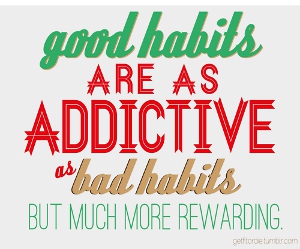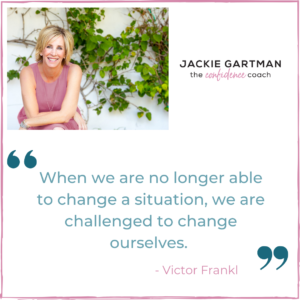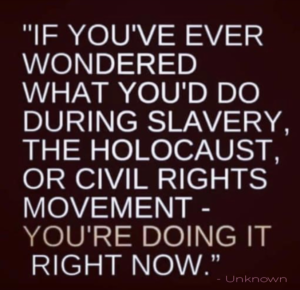Guest Post by blogger Karena Kilcoyne
Kicking the Habit ~ It's All In Your Head by Karena Kilcoyne
 I have a habit that I want to kick. I
I have a habit that I want to kick. I
drink Diet Coke. I know that artificial sweeteners are not good for me. I know
that the fizzy sensation on my tongue will only last a second and then it will
be over. Yet, the moment I eat something salty, I find myself mindlessly
walking to the fridge, grabbing a can of Diet Coke, cracking it open, and ahhh.
I don't drink the whole can, and I don't order Diet Coke at restaurants, so
you'd think it would be easy to kick this half a can a day habit, right? Not so
much.
With my conditioned response to swig
Diet Coke whenever I eat something salty, I was beginning to feel like Pavlov's
dog. I knew there had to be a way to kick my habit, so I reached out to Jackie
Gartman, a Martha Beck certified Master Life Coach, for some help. Jackie
suggested that before kicking the habit, I should understand how I developed
it. To do that, we had to explore the brain. The mind can be a scary place, but
with her guidance, I agreed to poke around up there.
It's
How We're Wired.
All habits have three parts: cue,
routine, and reward. The cue is what fires our brain to choose the routine that
fits the situation. For me, the cue is eating something salty and the routine
is drinking Diet Coke. And then we get to good part – the reward. The reward
must be good enough to encourage the brain to remember the routine. With enough
repetition, the cue, routine, and reward cycle creates a neurological pattern
in our brain that becomes, you guessed it, a habit.
What's
In It For Me?
Wait just a second, could carbon
dioxide bubbles dancing on my tongue really be enough of a reward to keep me
drinking Diet Coke? No. It's something more powerful than those fizzy bubbles.
It's dopamine. Jackie filled me in on the wicked power of this pleasure-causing
chemical. "It conditions the brain to want the reward over and over
again, which releases more dopamine and reinforces the habit."
Aha! This dopamine high explains why I
drink Diet Coke even though I know it's not good for me. Jackie went on to
explain, "The reason why we engage in bad habits like smoking, drinking
excessively, or biting our nails is because there is a perceived desirable
outcome or reward (the dopamine surge) that makes us want to repeat the behavior
that caused it. For example, if we bite our nails because we believe that
our anxiety will dissipate, and it does, the reward or momentary high we get
from it reinforces the behavior, hence more nail biting."
We're
On Autopilot.
Over time, the cue, routine, reward
pattern becomes ingrained, and it's as if we're on autopilot. This explains why
sometimes I can't recall walking to the fridge or opening the can of Diet Coke.
A 2006 research study by Duke University found that more than forty
percent of our daily actions are habitual. Jackie agrees, "When we’re in
the midst of a habit, we’re thinking less. Our neurological activity
literally decreases. That’s why the habit feels so automatic,
almost unconscious."
Mind
Over Matter.
With all this decreased brain function
and "doping" going on, how do we kick the habit, break the routine,
and get off the juice? Jackie assured me that it is possible to break unhealthy
habits. You just have to "rewire" your brain.
Here are her tips on showing your
brain who's boss.
1. Start with a small habit. Focusing on small change is much
more sustainable than attempting big changes. The momentum from successfully
making small changes will lead you into changing bigger habits.
2. Ask yourself why you want to
break the habit. Knowing why you are doing it will keep you motivated
to stay the course when things get difficult.
3. Disrupt the rut. Get rid of the cues that trigger the bad habit.
For example, if you want to drink less, commit to hitting the gym after
work instead of going to happy hour.
4. Have an “if/then” strategy. Jackie told me that she wanted to stop
drinking orange juice every morning because it was spiking her blood sugar
and causing her to crash a couple of hours later. To break the habit, she
used an if/then strategy. If she had breakfast, then she would have a glass of
water instead of orange juice. Repeating your if/then strategy helps reinforce
the new habit.
5. Repeat the new behavior at the same time of day. Resolved to
exercise? Do it at the same time each day.
6. Reward yourself. Maybe it’s a manicure and pedicure, or treating
yourself to a movie in the middle of the day. You can get a dopamine high
from good habits too.
7.
Don’t beat yourself up if you fall back into your old habit. Acknowledge
that you’re human and notice what triggered your setback. Being aware of the
cues will help you learn more about yourself, which is always a good
thing.
I took Jackie's advice and developed a
plan to kick my Diet Coke habit. It wasn't realistic to remove the cue
altogether. I wasn't going to give up salty foods, and I couldn't stop buying
the Diet Coke because other people in my house want to drink it. But, I did
move the cans to another location so they weren't in my immediate reach. I also
developed an if/then strategy – if I eat something salty, then I will reach for
sparkling water.
And then the good part – my reward.
For each day I don't drink Diet Coke, I reward myself with evening magazine
reading. Jackie said that it takes thirty days to change a habit, and I'm
almost there. On day thirty-one you'll find me at the mall buying a new bathing
suit. Summer's right around the corner and with my aspartame free body, I'll be
ready for it. Thanks to Jackie and her expert advice, I've learned how to make
my brain work for me instead of against me. Like anything, you just have to
know how to work the system, dopamine and all.
About Karena Kilcoyne
Karousing.com is a lifestyle blog
where Karena Kilcoyne shares her discoveries about travel, style, wellness,
beauty, and spirituality. Karousing is a play in Karena’s name and the essence
of carousing. It’s her fun, sexy, spiritual exploration of life. Are you ready
to start Karousing?




